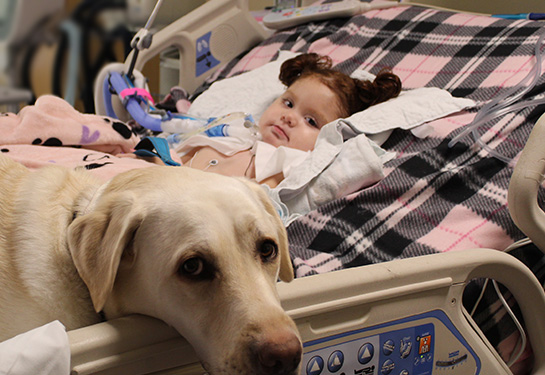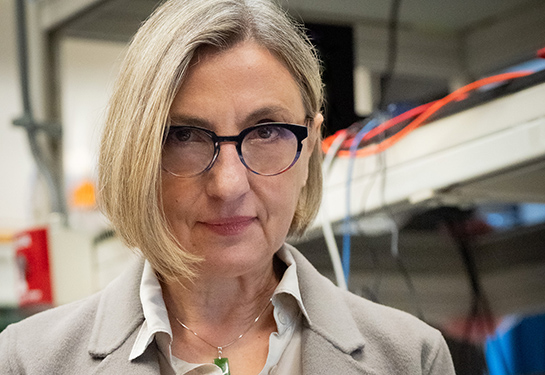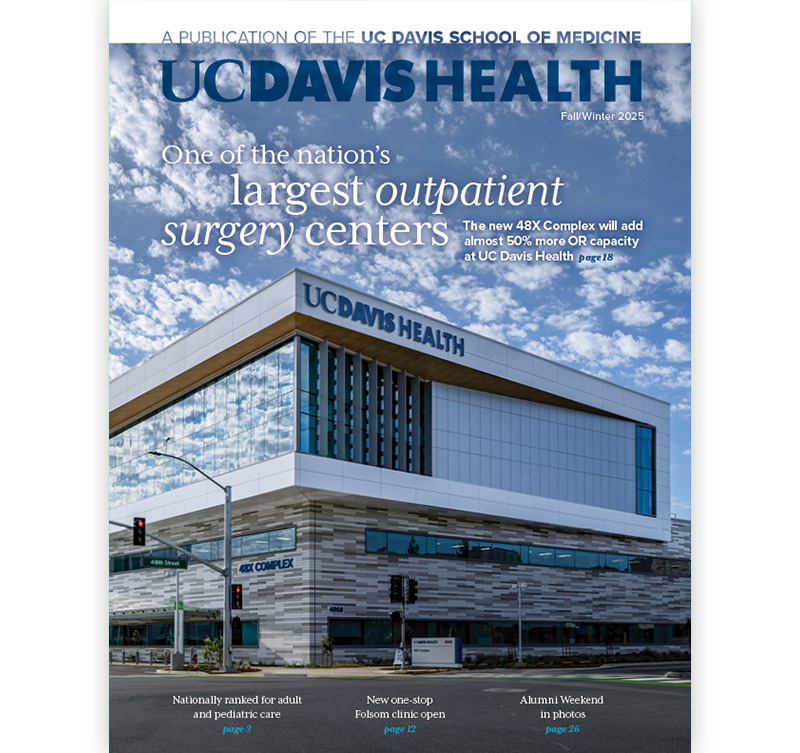Care team and experimental drug help toddler regain mobility
Alaina’s clumsiness was getting worse — it was the first sign that something was seriously wrong with the toddler.
During her first year of her life, Alaina met the usual developmental milestones, progressing as expected. But by the time she was 18 months, Alaina’s parents, Karina Rodriguez and Christian Leos, grew concerned because their daughter was often falling down. Even the smallest transition from hard flooring to carpet would cause her to fall.
Alaina’s pediatrician in Marysville referred her to UC Davis Children’s Hospital, hoping that the teams in pediatric neurology, orthopaedics, Physical Medicine and Rehabilitation and Genomic Medicine could solve the mystery.

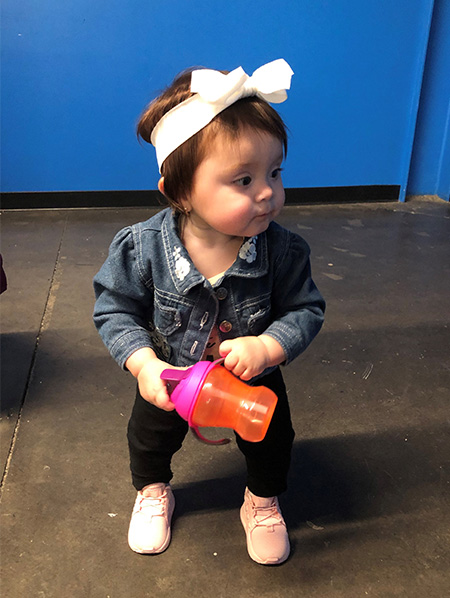
Over the next several months, Alaina gradually lost her mobility.
One day, she was no longer able to walk. To get around, she relied on cruising, holding onto the couch.
As Alaina’s condition progressed, she lost her ability to raise her arms above her head. Then she lost the ability to support her head. Whenever Alaina sat on her parents’ lap, they had to support her neck.
Genetic testing at the UC Davis Genomic Medicine Clinic, based at the UC Davis MIND Institute, revealed she had an autosomal recessive disease called thymidine kinase 2 deficiency (TK2D), which causes progressive muscle weakness in childhood. Karina and Christian were carriers of this very rare gene.
According to the National Organization for Rare Diseases, TK2D was first described in 2001 in four children with severe muscle disease. As of 2022, there have been fewer than 120 patients described in the medical literature.
There is no standard treatment for TK2D. Children with the serious form of this condition, which Alaina had, rarely live past infancy or toddlerhood.
An experimental drug brings hope
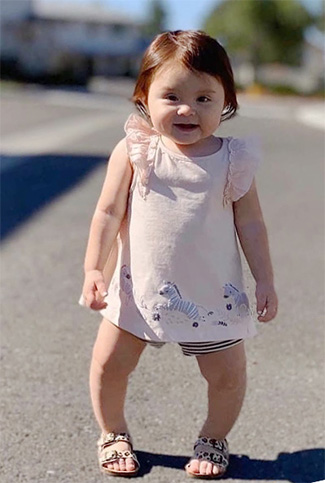
However, a glimmer of hope appeared. At the time of Alaina's diagnosis, an experimental drug called MT1621 had just completed a small pilot trial and showed promise to proceed to a larger multi-institutional clinical trial. UC Davis clinical geneticist Joseph Shen thought MT1621 could be a lifeline for Alaina, whose mobility continued to degenerate.
By Winter 2022, Alaina’s condtition had reached its worst point: She could only look towards people or objects and barely move her right hand and fingers. She struggled to breathe, after catching respiratory syncytial virus (RSV), a common respiratory virus that infects the lungs and breathing passages.
She then developed respiratory failure with pneumonia. She was hospitalized for more than two months at the UC Davis Pediatric Intensive Care Unit.
Due to her genetic condition, she couldn’t cough up mucus, which meant a ventilator would have to help her breathe. She was unable able to speak or eat during her hospitalization. She received nutrition through a gastrostomy tube inserted through her belly.
Alaina’s doctors knew they were battling against time.
“Her health was declining rapidly, but the clinical trial for MT1621 had not started enrolling yet. We needed a plan B. We couldn’t wait,” Shen said.
Her health was declining rapidly, but the clinical trial for MT1621 had not started enrolling yet. We needed a plan B. We couldn’t wait.”—Joseph Shen
FDA approves compassionate use of MT1621
Shen pursued Federal Drug Administration (FDA) approval of MT1621. Thankfully, the FDA approved his compassionate use request, and Alaina received her first dose on Dec. 29, 2021, while still hospitalized at UC Davis Children’s Hospital.
MT1621 is a powder that dissolves in water, and Alaina takes it three times a day. Some patients have reported side effects such as stomach pain and diarrhea, but she has had no ill effects.
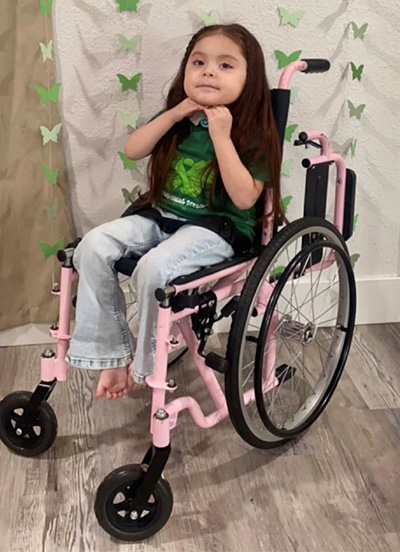
Best of all, the drug has restored much of the motor function she had lost. Alaina’s recovery has been steady:
- After one month of treatment, she could move her right leg, side to side, to dance to the beat of her favorite song.
- Two months into treatment, she was responding to a rapid-tempo song by moving both arms, both legs, and shaking her head back and forth.
- Six months later, she could raise her arms over her head.
As the months progressed, she unlocked more and more movement on her own.
After a year and a half of treatment, Alaina wowed her Genomic Medicine team by showing off her wheelchair skills, manually pushing herself in the exam room.
Alaina is now 4 years old. Her parents describe her as sassy, resilient and silly.
“The medicine has brought our daughter back to us,” Karina said.
Alaina will start preschool this year. Her parents say that all of her achievements would not have been possible without the FDA approval of a compassionate usage of MT1621 and the UC Davis team that advocated for her.
“Honestly, we love UC Davis. They’re so good with her and we are so proud of her progress. They have helped us through so much,” said Karina.
Alaina continues to be seen by UC Davis pediatric specialists who are leading experts in the fields of genomic medicine, pulmonology, Physical Medicine & Rehabilitation, neurology, ENT and gastroenterology.
“Alaina’s story is a perfect example of how genetic testing provided the path to precision medicine,” said Suma Shankar, chief of the UC Davis genomic medicine division. “Our unique approach to this ultra-rare condition changed the prognosis for this patient completely. It literally changed the trajectory of her life,” Shankar said. “It is why we do the work we do.”


